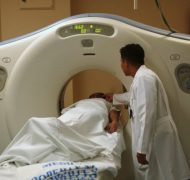People Work in a Fallen Creation (Genesis 4-8)
Bible Commentary / Produced by TOW Project
When God drives Adam and Eve from the Garden of Eden (Gen. 3:23-24), they bring with them their fractured relationships and toilsome work, scratching out an existence in resistant soil. Nonetheless, God continues to provide for them, even to the point of sewing clothes for them when they lack the skill themselves (Gen. 3:21). The curse has not destroyed their ability to multiply (Gen. 4:1-2), or to attain a measure of prosperity (Gen. 4:3-4).
The work of Genesis 1 and 2 continues. There is still ground to be tilled and phenomena of nature to be studied, described, and named. Men and women must still be fruitful, must still multiply, must still govern. But now, a second layer of work must also be accomplished—the work of healing, repairing, and restoring the things that go wrong and the evils that are committed. To put it in a contemporary context, the work of farmers, scientists, midwives, parents, leaders, and everyone in creative enterprises is still needed. But so is the work of exterminators, doctors, funeral directors, corrections officers, forensic auditors, and everyone in professions that restrain evil, forestall disaster, repair damage, and restore health. In truth, everyone’s work is a mixture of creation and repair, encouragement and frustration, success and failure, joy and sorrow. Roughly speaking, there is twice as much work to do now than there was in the garden. Work is not less important to God’s plan, but more.
The First Murder (Genesis 4:1-25)
Back to Table of Contents Back to Table of ContentsGenesis 4 details the first murder when Cain kills his brother Abel in a fit of angry jealousy. Both brothers bring the fruit of their work as offerings to God. Cain is a farmer, and he brings some of the fruit of the ground, with no indication in the biblical text that this is the first or the best of his produce (Gen. 4:3). Abel is a shepherd and brings the "firstlings," the best, the “fat portions” of his flock (Gen. 4:4). Although both are producing food, they are neither working nor worshiping together. Work is no longer a place of good relationships.
God looks with favor on the offering of Abel but not on that of Cain. In this first mention of anger in the Bible, God warns Cain not to give into despair, but to master his resentment and work for a better result in the future. “If you do well, will you not be accepted?” the Lord asks him (Gen. 4:7). But Cain gives way to his anger instead and kills his brother (Gen. 4:8; cf. 1 John 3:12; Jude 11). God responds to the deed in these words:
"Listen; your brother's blood is crying out to me from the ground! And now you are cursed from the ground, which has opened its mouth to receive your brother's blood from your hand. When you till the ground, it will no longer yield to you its strength; you will be a fugitive and a wanderer on the earth." (Gen. 4:10-12)
Adam’s sin did not bring God’s curse upon people, but only upon the ground (Gen. 3:17). Cain’s sin brings the ground’s curse on Cain himself (Gen. 4:11). He can no longer till the ground, and Cain the farmer becomes a wanderer, finally settling in the land of Nod, east of Eden, where he builds the first city mentioned in the Bible (Gen. 4:16-17). (See Gen. 10-11 for more on the topic of cities.)
The remainder of chapter 4 follows Cain's descendants for seven generations to Lamech, whose tyrannical deeds make his ancestor Cain seem tame. Lamech shows us a progressive hardening in sin. First comes polygamy (Gen. 4:19), violating God's purpose in marriage in Genesis 2:24 (cf. Matt. 19:5-6). Then, a vendetta that leads him to kill someone who had merely struck him (Gen. 4:23-24). Yet in Lamech we also see the beginnings of civilization. Division of labor —which spelled trouble between Cain and Abel—brings a specialization here that makes certain advances possible. Some of Lamech’s sons create musical instruments and ply crafts using bronze and iron tools (Gen. 4:21-22). The ability to create music, to craft the instruments for playing it, and to develop technological advances in metallurgy are all within the scope of the creators we are created to be in God's image. The arts and sciences are a worthy outworking of the creation mandate, but Lamech's crowing about his vicious deeds points to the dangers that accompany technology in a depraved culture bent on violence. The first human poet after the Fall celebrates human pride and abuse of power. Yet the harp and the flute can be redeemed and used in the praise of God (1 Sam. 16:23), as can the metallurgy that went into the construction of the Hebrew tabernacle (Exod. 35:4-19, 30-35).
As people multiply, they diverge. Through Seth, Adam had hope of a godly seed, which includes Enoch and Noah. But in time there arises a group of people who stray far from God’s ways.
When people began to multiply on the face of the ground, and daughters were born to them, the sons of God saw that they were fair, and they took wives for themselves of all that they chose.... The Nephilim [giants, heroes, fierce warriors—the meaning is unclear] were on the earth in those days—and also afterward—when the sons of God went in to the daughters of humans, who bore children to them. These were the heroes that were of old, warriors of renown. The Lord saw that the wickedness of humankind was great in the earth, and that every inclination of the thoughts of their hearts was only evil continually. (Gen. 6:1-5)
What could the godly line of Seth—narrowed eventually to only Noah and his family—do against a culture so depraved that God would eventually decide to destroy it utterly?
A major workplace issue for many Christians today is how to observe the principles that we believe reflect God's will and purposes for us as his image-bearers or representatives. How can we do this in cases where our work puts us under pressure toward dishonesty, disloyalty, low-quality workmanship, unlivable wages and working conditions, exploitation of vulnerable co-workers, customers, suppliers, or the community at large? We know from Seth’s example—and many others in Scripture—that there is room in the world for people to work according to God’s design and mandate.
When others may fall into fear, uncertainty, and doubt, or succumb to unbounded desire for power, wealth, or human recognition, God’s people can remain steadfast in ethical, purposeful, compassionate work because we trust God to bring us through the hardships that may prove too much to master without God’s grace. When people are abused or harmed by greed, injustice, hatred, or neglect, we can stand up for them, work justice, and heal hurts and divisions because we have access to Christ’s redeeming power. Christians, of all people, can afford to push back against the sin we meet at our places of work, whether it arises from others’ actions or within our own hearts. God quashed the project at Babel because “nothing that they propose to do will now be impossible for them” (Gen. 11:6), for people did not refer to our actual abilities but to our hubris. Yet by God’s grace we actually do have the power to accomplish all God has in store for us in Christ, who declares that “nothing will be impossible for you” (Matt. 17:20) and “nothing will be impossible with God” (Luke 1:37).
Do we actually work as if we believe in God’s power? Or do we fritter away God’s promises by simply trying to get by without causing any fuss?
God Calls Noah and Creates a New World (Genesis 6:9-8:19)
Back to Table of Contents Back to Table of ContentsSome situations may be redeemable. Others may be beyond redemption. In Genesis 6:6-8 , we hear God's lament about the state of the pre-flood world and culture, and his decision to start over:
The Lord was sorry that he had made humankind on the earth, and it grieved him to his heart. So the Lord said, "I will blot out from the earth the human beings I have created—people together with animals and creeping things and birds of the air, for I am sorry that I have made them." But Noah found favor in the sight of the Lord.
From Adam to us, God looks for persons who can stand against the culture of sin when needed. Adam failed the test but sired the line of Noah, "a righteous man, blameless in his generation; Noah walked with God" (Gen. 6:9). Noah is the first person whose work is primarily redemptive. Unlike others, who are busy wringing a living from the ground, Noah is called to save humanity and nature from destruction. In him we see the progenitor of priests, prophets, and apostles, who are called to the work of reconciliation with God, and those who care for the environment, who are called to the work of redeeming nature. To greater or lesser degrees, all workers since Noah are called to the work of redemption and reconciliation.
But what a building project the ark is! Against the jeers of neighbors, Noah and his sons must fell thousands of cypress trees, then hand plane them into planks enough to build a floating zoo. This three-deck vessel needs the capacity to carry the various species of animals and to store the food and water required for an indefinite period. Despite the hardship, the text assures us that "Noah did this; he did all that God commanded him" (Gen. 6:13-22).
In the business world, entrepreneurs are used to taking risks, working against conventional wisdom in order to come up with new products or processes. A long-term view is required, rather than attention to short-term results. Noah faces what must at times have seemed to be an impossible task, and some biblical scholars suggest that the actual building of the ark took a hundred years. It also takes faith, tenacity, and careful planning in the face of skeptics and critics. Perhaps we should add project management to the list of Noah’s pioneering developments. Today innovators, entrepreneurs, and those who challenge the prevailing opinions and systems in our places of work still need a source of inner strength and conviction. The answer is not to talk ourselves into taking foolish risks, of course, but to turn to prayer and the counsel of those wise in God when we are confronted with opposition and discouragement. Perhaps we need a flowering of Christians gifted and trained for the work of encouraging and helping refine the creativity of innovators in business, science, academia, arts, government, and the other spheres of work.
The story of the flood, found in Genesis 7:1-8:19, is well known. For more than half a year Noah, his family, and all of the animals bounce around inside the ark as the floods rage, swirling the ark in water covering the mountaintops. When at last the flood subsides, the ground is dry and new vegetation is springing up. The occupants of the ark once again step on dry land. The text echoes Genesis 1, emphasizing the continuity of creation. God blows a “wind” over “the deep” and “the waters” recede (Gen. 8:1-3). Yet it is, in a sense, a new world, reshaped by the force of the flood. God was giving human culture a new opportunity to start from scratch and get it right. For Christians, this foreshadows the new heaven and new earth in Revelation 21-22, when human life and work are brought to perfection within the cosmos healed from the effects of the Fall, as we discussed in "God brings the material world into being" (Gen. 1:1-2).
What may be less apparent is that this, humanity’s first large-scale engineering work, is an environmental project. Despite—or perhaps as a result of—humanity’s broken relationship with the serpent and all creatures (Gen. 3:15), God assigns a human being the task of saving the animals and trusts him to do it faithfully. People have not been released from God’s call to "have dominion over the fish of the sea and over the birds of the air and over every living thing that moves upon the earth" (Gen. 1:28). God is always at work to restore what was lost in the Fall, and he uses fallen-but-being-restored humanity as his chief instrument.








